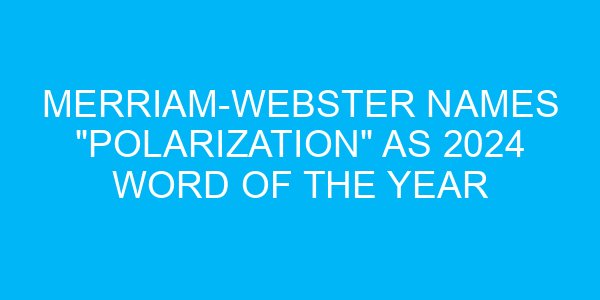Merriam-Webster has selected “polarization” as its 2024 word of the year, reflecting the intense divisions characterizing global and national conversations. Defined as “division into two sharply distinct opposites,” the term encapsulates the ideological, political, and cultural schisms dominating discourse this year.
Why Polarization?
- Search Popularity: Throughout 2024, polarization was a highly searched term on Merriam-Webster.com, driven by its relevance to the U.S. presidential election, international conflicts, and cultural debates.
- Cultural and Political Resonance: Media coverage, particularly by networks like MSNBC and Fox News, frequently employed the term when analyzing politics, societal divisions, and electoral outcomes.
Additional Words of Interest in 2024
Merriam-Webster also highlighted other words that captured the zeitgeist:
- “Democracy”: A term at the heart of bipartisan discussions, reflecting renewed efforts to define, protect, and challenge democratic principles.
- “Pander”: Popular during election season, often used to critique perceived attempts to appease specific voter groups.
- “Weird”: Experienced a spike in July, coinciding with political commentary and viral internet discussions.
- “Cognitive”: Lookups surged amid discussions about the mental health of aging political leaders.
Beyond Politics
Words tied to current events and pop culture also trended:
- “Totality”: Interest peaked during April’s solar eclipse.
- “Allision”: Frequently searched after the Francis Scott Key Bridge collapse in Baltimore.
- “Demure”: Inspired by a viral TikTok meme, highlighting its cross-cultural appeal.
Global Counterparts
Other dictionaries also released their own notable words:
- Oxford Word of the Year: “Brain rot”, reflecting hyper-online communication trends among Gen Z and Gen Alpha.
- Collins Word of the Year: “Brat”, inspired by Charli XCX’s album and its cultural impact.
Final Thoughts
The choice of polarization as Merriam-Webster’s word of the year is a mirror to society’s challenges in finding common ground. As the world grapples with complex issues, understanding such terms helps frame meaningful dialogue around division and unity.



